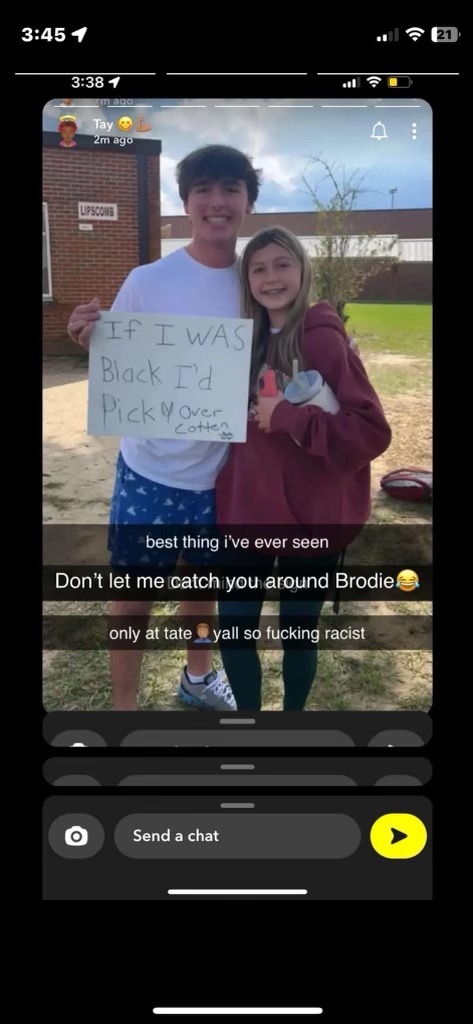Is Slavery In Black History Really Important In Schools?
From the onset of slavery, individuals of African descent have endured relentless discrimination based on their skin color and the historical injustices they were subjected to as a community. Paradoxically, when Black individuals discuss how this legacy continues to impact their community or broach the topic of reparations, they often encounter a response from white America urging them to let go of the past and move forward. Nonetheless, whenever racially insensitive remarks or actions occur, it serves as an enduring reminder of the past. This raises the question: should the legacy of slavery be relegated to history? Furthermore, how can a societal issue that persists be rectified if it remains unaddressed and unspoken of? This brings us to this past weekend’s events or many of the events that have taken place across the country this year.
In the state of Florida, it’s disheartening to observe that African-American history has been marginalized, largely due to concerns that some white parents have about their children feeling uncomfortable. However, instances like the one I encountered and shared prompt a crucial question: Why must black children consistently bear the burden of discomfort at the expense of their white peers?

Observing such brazen actions, like the one in front of Tate High School, raises a valid concern about the well-being of black children and how they are affected by the actions of their white peers. It is a challenging situation for black parents who want their children to feel safe and respected in their educational environment. Here are some steps that concerned parents and the community can consider:
Open Communication: Encourage open and honest communication with your children. Create a safe space for them to express their feelings and experiences. Listen to their concerns and provide guidance and support.
Community Support: Connect with other parents and community members who share similar concerns. Building a support network can help in addressing issues collectively and advocating for change.
Engage with the School: Attend school board meetings and engage in discussions with school administrators and teachers. Express your concerns about incidents like these and advocate for policies and programs that promote diversity, inclusion, and sensitivity.
SEA CREST PROCUREMENT LLC
Streamlining Solutions, Procuring Excellence, Navigating Logistics: Your Trusted Partner in Service
Advocate for Curriculum Changes: Lobby for changes in the curriculum to include diverse perspectives and history, including Black History. This can help promote understanding and empathy among students.
Promote Awareness: Organize workshops, seminars, or events within the community to raise awareness about the importance of diversity, inclusion, and respect for all races and backgrounds.
Seek Legal Recourse: If the actions of certain individuals are causing harm or harassment, consider seeking legal advice to explore options for addressing these issues through legal channels.
Community Involvement: Encourage your children to get involved in positive community activities and organizations that promote unity and understanding among diverse groups.
Report Incidents: Encourage students and parents to report incidents of discrimination, harassment, or bullying to the school authorities. It’s important that these incidents are documented and addressed promptly.
Promote Empathy: Teach your children about the value of empathy and understanding. Help them understand the consequences of their actions on others and encourage them to stand up against discrimination.
Seek Professional Help: If your child is experiencing significant emotional distress as a result of these incidents, consider seeking support from a counselor or therapist who specializes in dealing with these issues.
It’s crucial for the community to come together to address these concerns and work toward creating a more inclusive and respectful environment for all students, regardless of their background. For this reason, we are rallying for the black community to get behind us talk about what happened, and help us go to the school board and demand changes.

by Katrice Johnson
I’m a graphic designer and web designer. I am also the author of three books and working on my fourth now.
For more information about me and how I can help you with your business, please go to my website Graphic Grooves Consulting







***𝐆𝐫𝐞𝐚𝐭 𝐍𝐞𝐰𝐬***
This morning, we received news that Brodie has been removed from the football team and suspended from school. However, these actions alone do not suffice. It is imperative that we confront the larger issues surrounding this situation. Both public officials in the state of Florida and our local government have unfortunately chosen to disregard the importance of Black History and the unvarnished truth within our educational system. To make your voices heard and effect meaningful change, here are some steps you can take:
𝐎𝐫𝐠𝐚𝐧𝐢𝐳𝐞 𝐂𝐨𝐦𝐦𝐮𝐧𝐢𝐭𝐲 𝐌𝐞𝐞𝐭𝐢𝐧𝐠𝐬: Gather black parents and community members to hold meetings or town hall discussions to openly address concerns and brainstorm solutions. Encourage an inclusive dialogue where different perspectives can be shared.
𝐅𝐨𝐫𝐦 𝐚 𝐂𝐨𝐦𝐦𝐢𝐭𝐭𝐞𝐞: Consider forming a committee or task force dedicated to advocating for changes in the school curriculum and policies. This group can research, strategize, and communicate effectively with the school board.
𝐄𝐧𝐠𝐚𝐠𝐞 𝐰𝐢𝐭𝐡 𝐭𝐡𝐞 𝐒𝐜𝐡𝐨𝐨𝐥 𝐁𝐨𝐚𝐫𝐝: Attend school board meetings as a group to present your concerns and demands. Prepare well-researched proposals and suggestions for curriculum changes and inclusion initiatives.
𝐏𝐞𝐭𝐢𝐭𝐢𝐨𝐧 𝐚𝐧𝐝 𝐀𝐝𝐯𝐨𝐜𝐚𝐜𝐲: Start a petition or letter-writing campaign to demonstrate community support for these changes. Encourage parents, students, and allies to sign and share the petition widely.
𝐌𝐞𝐞𝐭 𝐰𝐢𝐭𝐡 𝐒𝐜𝐡𝐨𝐨𝐥 𝐎𝐟𝐟𝐢𝐜𝐢𝐚𝐥𝐬: Request meetings with school administrators, teachers, and school board members to discuss your concerns and present your proposals for curriculum changes. Be persistent and prepared to engage in constructive dialogue.
𝐋𝐞𝐯𝐞𝐫𝐚𝐠𝐞 𝐌𝐞𝐝𝐢𝐚 𝐚𝐧𝐝 𝐏𝐮𝐛𝐥𝐢𝐜 𝐀𝐰𝐚𝐫𝐞𝐧𝐞𝐬𝐬: Use local media outlets and social media platforms to raise awareness about your cause. Share stories, experiences, and the importance of inclusive education. This can help garner public support.
𝐀𝐝𝐯𝐨𝐜𝐚𝐭𝐞 𝐟𝐨𝐫 𝐏𝐨𝐥𝐢𝐜𝐲 𝐂𝐡𝐚𝐧𝐠𝐞𝐬: Lobby for the adoption of policies within the school.
People think that once a law is put in place there is no recourse, however, laws are made to be challenged and if you are interested in helping us challenge what Ron DeSantis has put in place, please DM us. Our goal is to form a committee within the next week so we can start these discussions.